What falls away : a memoir (16 page)
Read What falls away : a memoir Online
Authors: 1945- Mia Farrow
Tags: #Farrow, Mia, 1945-, #Motion picture actors and actresses

Frank with our dog Samantha. Malcolm and me.
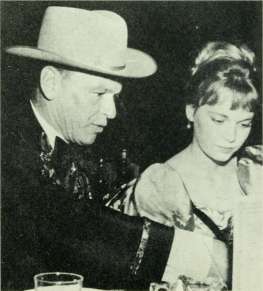
The Share Party, 1965: my first time out in public with Frank.
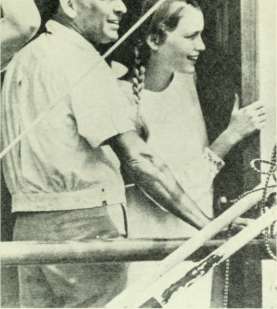
rhe boat trip.
Roz Russell, Claudette Colbert, and me with the boat behind us.
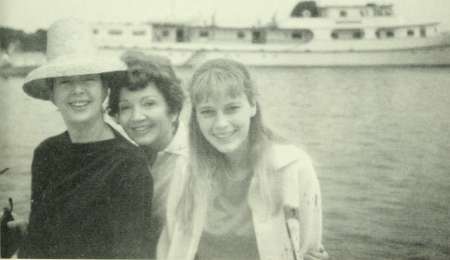
i
.li^^'
J)
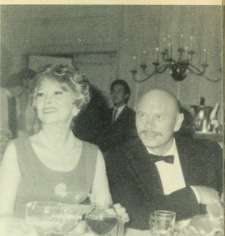
£ Ml
W^irh Bill Goetz.
Edie Goetz and Yul Br\'nner.
jusr married, 1966.
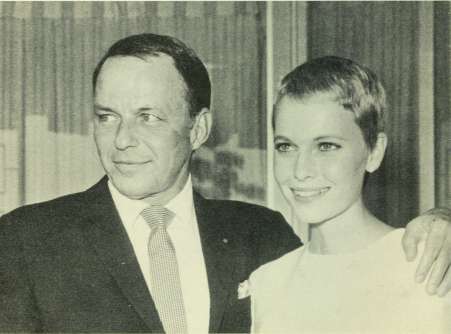
tra, and while I'm smiling let me say that I'm happy to write my name on your menu or your arm or wherever, and I don't mmd at all being dragged over to meet your family —it's mother's milk to me. Except it was a mistake, becoming famous—so I'd be grateful if you wouldn't get excited or think I'm anything special when I'm not.
Supposing you make a mistake at a very early age, and the mistake sets in motion certain mysterious forces that should never have been fiddled with in the first place. As a result, the fragile and complex connections between you and everybody else get screwed up, as people respond to illusions, artificial images. It's scary to think that nobody can see you. How is it possible to know anybody if they're busy reacting to a thing that isn't you? Frank says if you just keep movmg . . . But by becoming famous, I have bombed the very bridges I needed most, to cross the gulf, to connect with other people. Isn't that, in the end, what redeems us?
I could change my name. Dye my hair brown. Get fat. Move to another state. I'll pick a spot on the map, pack the music box and encyclopedias, or actually Barbara could do that and she'll take me and the encyclopedias and the music box to the airport, and then I guess I'd say good-bye to Barbara because I wouldn't need an assistant anymore. So I arrive there, somewhere, I rent a Hertz car, load up the encyclopedias, check into a motel, people do it all the time, and look for a sweet little dream house to buy (remember to call my business manager, find out how much money I have). Actually a whole different country might be best. Spin the globe. A bicycle repair shop in Peru! Dogs asleep on the dirt floor. I can even speak Spanish, sort of. There are countless options. What were they again? Change names. Dye hair. Get fat. Move to Peru. Fix bikes. Have I thought of everything? I wonder how long you can live on Sara Lee chocolate cake?
A phone call in the night. My sister Prudence, in Bos-
ton, unmoored in some nightmare of her own, was talking about transcendental meditation. Without understanding any of it, I filled a duffel bag with books and walked out the front door; I waved to the gardener, who was standing near the pink roses. I got into the car and Barbara drove me away from the house in Bel Air and all its contents, away from the gleaming grand piano, and the deaf cat watching from the window, my music box, and even my encyclopedias. Without understanding a thing I boarded a plane to Boston.
Prudence and I made our way through Boston's snowy streets to a crowded auditorium where Maharishi Mahesh Yogi was speaking. "The mind can transcend all limits of experience and thought," he said, "and is left in a field of pure Being—the source of all wisdom, creativity, peace, and happiness . . ."
Inside the numbness came a newborn nuzzling of hope. After the lecture we shouldered through the photographers and reporters.
"Where's Frankie?" someone yelled.
"Hey Mia, look this way.'"
"Is your marriage really over?"
My sister and I were haunted, shuddering specters in the flashing light. But Maharishi said, Come to India, Come to a teacher's training course there, and Prudy and I accepted. I said. Yes, I will learn to meditate, and seek enlightenment and peace at the foot of the Himalayas!
A world away from the leafy stillness of Bel Air, I groped numbly through New Delhi's anarchic streets. A swirling cacophony of Indian pop songs blared tinny out of countless unseen radios, as cars driving crazily played on horns; smells of spices, sewers, and piles of rotting garbage. There were cows with red spots painted on their foreheads and bells on their feet traipsing right through the middle of
everything, and everybody swarmed in all directions, shoving and spilling out of buses and rickshaws. Vivid saris fluttering, purple, sapphire, turquoise, and gold, unreadable watchful dusky faces, vendors of all kinds, fortune-tellers, snake charmers, magicians, flies, and flocks of ragged children, begging. From the gutter, a dead dog's eye stared back at me. It was a collision of magnificence and wretchedness. We journeyed north. Winds howled raw at the foot of the Himalayas, where saffron-swathed monks were wading serenely m the icy Ganges. By the bridge at Rishikesh, lepers begged with fingerless hands.
The ashram was a fenced compound consisting of six puri —single-story, concrete, barracks-style structures, each with ten simple rooms facing a single wan sapling in a sandy courtyard. A gravel path connected the buildings, then wound beneath tall eucalyptus trees toward the kitchen and dining area and beyond to the lecture hall where Maharishi addressed the meditators and responded to questions every evenmg. All these buildings stood on a hillside that descended steeply to the Ganges.
Patches of snow lay on the ground and the rooms had no heat. Each morning a bucket of steaming water was placed inside my door by a young Indian man with large, mistrustful eyes. I liked the austere little room—its hard bed, chest of drawers, and dim lamp met my needs perfectly.
We were a reverent, drab group of fifty or so men and women of various nationalities, ages, and professions. All spoke English and the course was conducted in this language. Maharishi suggested that we meditate for twelve hours of the day, taking short breaks as we needed. During these hours, when meditators, often wrapped in the heavy brown blankets from our beds, encountered one another along the gravel paths or beneath the trees, we exchanged
other-worldly smiles and the Sanscrit salutation "Jai Guru dev"
On the much-anticipated day of my initiation into meditation, I presented Maharishi with a bunch of cut flowers, as is customary, and sat cross-legged facing him, a little nervously. Then at last he gave me my mantra—my own secret, magical sound—and just as he said it, soft: like he did, I sneezed. So, I'm not positive, but mayhe I didn't quite catch it—his voice was so low, and the word or sound was strange and brief, and he had a beard, and he said it right in the middle of my sneeze, so after a moment I said, Excuse me, I don't think I quite heard you. But he would not say it again—ever. So I couldn't be one hundred percent sure I was doing it right. And when I brought it up, which I did from time to time, he would just wave it off. But when I was meditating, the thought would edge back into my mind that maybe I was doing it wrong, and that's what was keeping me out of the "field of pure Being."
I tried to meditate for the recommended twelve hours a day, but I rarely came close. At least I wasn't throwing up anymore, and my concentration had improved to the point where I could read again. With a book in hand, I would clamber down the hill to read or just to watch the Ganges rushing past. Sometimes I wandered across the bridge into the town of Rishikesh. When I brought back an emaciated, flea-ridden stray puppy, Maharishi named him Arjuna, after the warrior, and said he could stay with me at the compound.
All that I read, and most of my thoughts, were parts oi a. single process. My religion, as it had been presented to me and as I had interpreted it, was no longer helpftil, satisfying, or even acceptable to me—nonetheless, since childhood my orientation had been to a higher order. I could not be a nihilist. Separation from my faith had left me with a sense
of incompleteness that went far beyond missing Frank. I felt that I had lost what was at the heart of my existence: my bond with everything that is. With the help of the books I had brought with me, along with a few I found at the ashram, I began to redefine my relationship with Christianity, Catholicism, and Being.
In the Bhagavad Gita I read that the Divine Being is the very substance of the universe, but that everything we experience with our senses is merely illusion: "Water cannot wet It, nor can fire burn It, wind cannot dry It, and weapons cannot slay It. It is the all-pervading, omnipresent, divine Being . . . Hard it is to pierce that veil divine of various shows which hideth me; yet they who worship me pierce it and pass beyond."
The teachings of Buddha tell us that the Self is the greatest obstacle to true understanding: "The worldling will not understand, for to him there is happiness in selfhood only, and the bliss that lies in a complete surrender to Truth is unintelligible to him."
Thomas Jefferson wrote extensively about Jesus Christ, and guided by his work I began to discriminate between the core of His teachings and the dogma that has been attached to it. "We must reduce our volume to the simple Evangelists," he wrote. "Select, even from them, the very words only of Jesus . . . There will be found remaining the most sublime and benevolent code of morals which has ever been offered to man . . . Among the sayings and discourses imputed to Him by His biographers, I find many passages of fine imagmation, correct morality, and of the most lovely benevolence; and others again of so much ignorance, so much absurdity, so much untruth, charlatanism, and imposture, as to pronounce it impossible that such contradictions should have proceeded from the same being. I separate therefore the gold from the dross . . . When, in short, we shall have unlearned everything which has been taught since His day, and got back to the pure and simple doctrines He